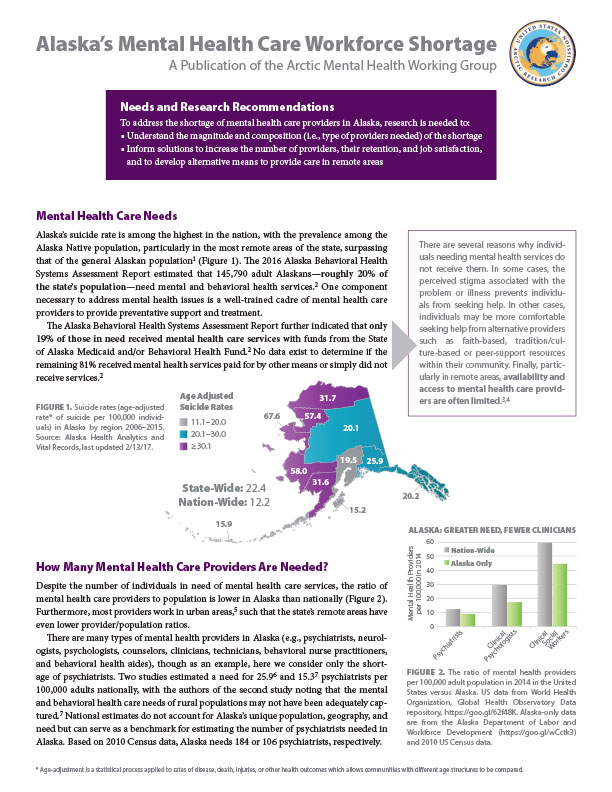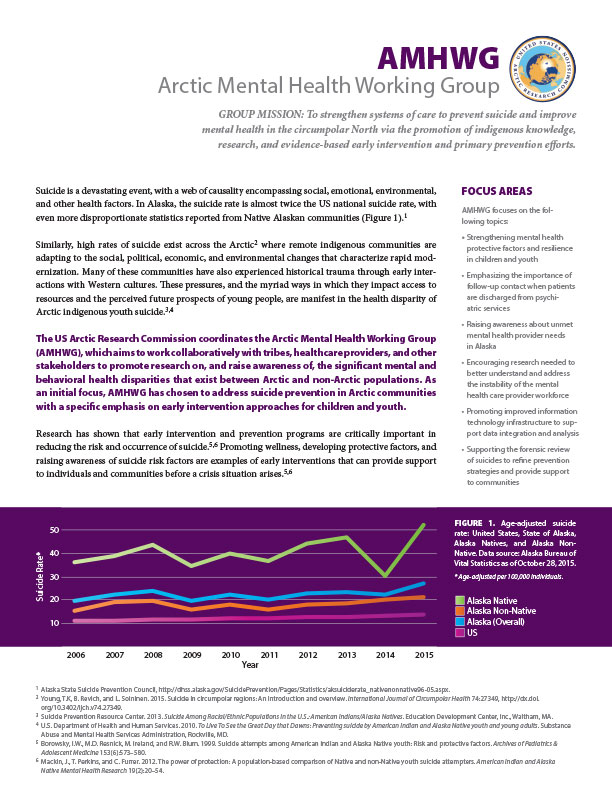Brochures
February 2023
USARC Commissioners
USARC’s seven Commissioners, appointed by the President, include four members from academic or research institutions, two members from private industry undertaking commercial activities in the Arctic, and one member from among the Indigenous residents of the Arctic. The eighth member of the Commission is the Director of the National Science Foundation, who serves as a nonvoting, ex officio member. This brochure provides short biographies for each USARC Commissioner.
Available Format: 975 KB pdf
October 2017
Alaska’s Mental Health Care Workforce Shortage
Roughly 20% of Alaska’s population is estimated to need mental and behavioral health services. Despite this, the ratio of mental health care providers to population is low compared to national levels. This publication examines the need for increased numbers of mental health care providers in an Alaska and provides research recommendations to address the shortage.
Available Format: 506 KB pdf
Updated August 2017
AMHWG: Arctic Mental Health Working Group
This USARC coordinated Arctic Mental Health Working Group aims to work collaboratively with tribes, health care providers, and other stakeholders to promote research on, and raise awareness of, the significant mental and behavioral health disparities that exist between Arctic and non-Arctic populations. As an initial focus, the group has chosen to address suicide prevention in Arctic communities with a specific emphasis on early intervention approaches for children and youth.
Available Format: 384 KB pdf
Updated August 2017
AREWG: Arctic Renewable Energy Working Group
This USARC coordinated working group promotes research on renewable and efficiency energy systems in remote Arctic communities. The working group’s mission is to benefit Arctic communities by identifying and addressing critical renewable energy and energy efficiency research needs. Integration of renewable resources and supporting technologies into a community’s current power generation capacity has the potential to decrease cost to consumers, air pollution, and carbon footprint and increase local employment.
Available Format: 412 KB pdf
Updated March 2017
ARWSWG: Alaska Rural Water and Sanitation Working Group
Within Alaska there are significant health disparities related to the lack of access to in-home water and sewer services. This inequity is particularly felt in remote villages. Alaska ranks last among U.S. states for the proportion of homes with running water and sewer service; approximately 22% of rural Alaskan households lack in-home water and sewer service. There is strong evidence that in-home water and sewer service is linked to better health.
Available Format: 280 KB pdf
September 2014
Why the Arctic Matters
Often perceived as being remote and disconnected, the Arctic directly impacts the rest of the world. In this brochure, examples based on weather, security, research, health, and the environment demonstrate these close links.
Available Format: 767 KB pdf
November 2010
SCICEX: The US Navy Submarine Arctic Science Program
The SCience ICe EXercise (SCICEX) program is a collaboration between the US Navy and the marine research community to use nuclear-powered submarines for scientific studies of the Arctic Ocean. Unlike surface ships, submarines have the unique ability to operate and take measurements regardless of sea ice cover and weather conditions. The goal of the program is to acquire comprehensive data about Arctic sea ice, water properties (biological, chemical, and hydrographic), and water depth (bathymetry) to improve our understanding of the Arctic Ocean basin and its role in Earth’s climate system. This brochure provides an introduction to SCICEX.
Available Formats: 390 KB pdf | 5.2 MB pdf
Home | About | Publications | Working Groups | News & Events | Policies | Photo Credits | Privacy
Looking for U.S. government information and services? Visit USA.gov
Connect
Looking for U.S. government information and services? Visit USA.gov









